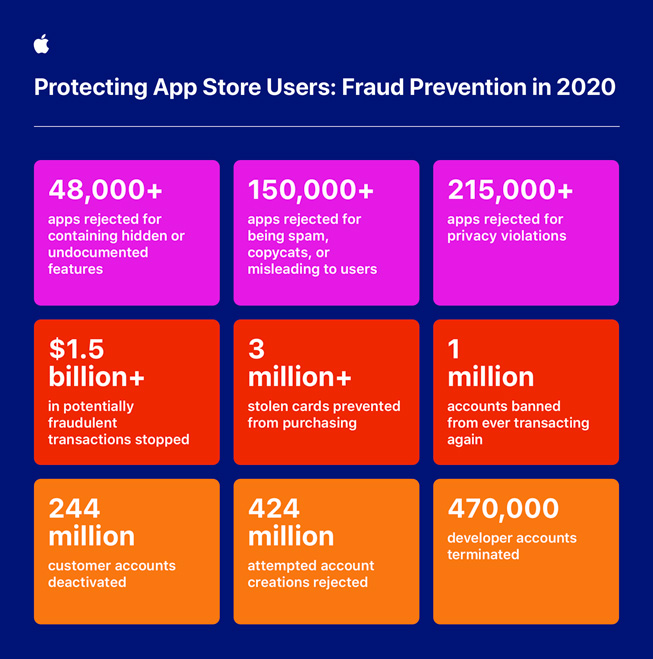Account Fraud
Unfortunately, sometimes developer accounts are created entirely for fraudulent purposes. If a developer violation is egregious or repeated, the offender is expelled from the Apple Developer Program and their account terminated. Apple terminated 470,000 developer accounts in 2020 and rejected an additional 205,000 developer enrolments over fraud concerns, preventing these bad actors from ever submitting an app to the store.
Despite fraudsters’ sophisticated techniques to obscure their actions, Apple’s aggressive monitoring means these accounts are terminated, on average, less than a month after they are created.
Apple’s work to ensure the safety of users who download apps extends even beyond the App Store. Over the last 12 months, Apple found and blocked nearly 110,000 illegitimate apps on pirate storefronts. These storefronts distribute malicious software often designed to resemble popular apps — or that modify popular apps without their developers’ authorisation — while circumventing the App Store’s security protections.
And in just the last month, Apple blocked more than 3.2 million instances of apps distributed illicitly through the Apple Developer Enterprise Program. The program is designed to allow companies and other large organisations to develop and privately distribute internal-use apps to their employees that aren’t available to the general public. Fraudsters attempt to distribute apps via this method to circumvent the rigorous App Review process, or to implicate a legitimate enterprise by manipulating an insider to leak credentials needed to ship illicit content.
In addition to fraudulent developer accounts, Apple works to identify and deactivate fraudulent user accounts. In 2020 alone, Apple deactivated 244 million customer accounts due to fraudulent and abusive activity. In addition, 424 million attempted account creations were rejected because they displayed patterns consistent with fraudulent and abusive activity.
Payment and Credit Card Fraud
Financial information and transactions are some of the most sensitive data that users share online. Apple has invested significant resources in building more secure payment technologies like Apple Pay and StoreKit, which are used by more than 900,000 apps to sell goods and services on the App Store. For example, with Apple Pay, credit card numbers are never shared with merchants — eliminating a risk factor in the payment transaction process.
With online data breaches frustratingly common, these protections are an essential part of keeping users safe. But users may not realise that when their credit card information is breached or stolen from another source, fraudsters may turn to online marketplaces like the App Store to attempt to purchase digital goods and services that can be laundered or used for illicit purposes.
Apple focuses relentlessly on this kind of fraud as well. In 2020 alone, the fusion of sophisticated technology and human review prevented more than 3 million stolen cards from being used to purchase stolen goods and services, and banned nearly 1 million accounts from transacting again. In total, Apple protected users from more than $1.5 billion in potentially fraudulent transactions in 2020.
From App Review, to fraudulent account detection, to prevention of financial crimes, Apple works around the clock and behind the scenes to keep the App Store a safe and trusted place for users and developers alike.
